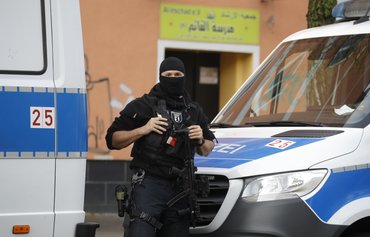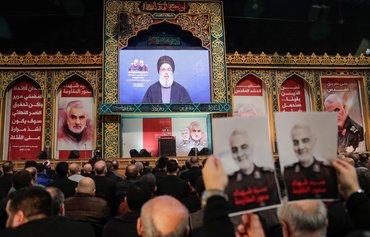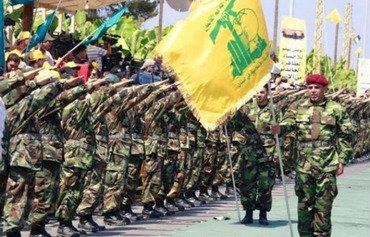Lebanese politicians have welcomed Britain's decision to classify Hizbullah, including both its military and political wings, as a terrorist organisation, saying this is appropriate and will help Lebanon restore its sovereignty.
Per the February 28th ruling, British law will punish anyone who supports, joins or promotes Hizbullah militias with a penalty of up to 10 years in prison.
The British government justified its decision by saying Hizbullah continues to arm itself in contravention of UN Security Council resolutions.
Hizbullah's support of Syrian President Bashar al-Assad's regime also has "prolonged the conflict and stoked the regime’s violent and brutal repression of the Syrian people", it added.
The British government had on two previous occasions, in 2001 and 2008, imposed a ban on the group's external security and military wings.
Former Lebanese MP Mustafa Alloush, a Future Movement official, welcomed the British decision, telling Al-Mashareq the time has come to crack down on Hizbullah on account of its illegal practices and military intervention in Syria.
He also pointed to Hizbullah's intervention in Yemen and to its involvement in illegal activities such as money laundering.
"It is wrong to see the party as having two wings, because it is practically a military party, and its political wing is merely for cover," he said, adding that its activities in Lebanon and abroad have led others to the same conclusion.
Alloush stressed the need to bring Hizbullah under control by pressuring its sponsor state, Iran, in order to mitigate the damage it is causing Lebanon.
Curbing criminal activity
Lebanese Centre for Research and Consulting director Hassan Qutb said the British decision was "not surprising, and stems from Hizbullah’s involvement in drug smuggling and money laundering in Lebanon and abroad".
It has important implications as Iran and its Islamic Revolutionary Guard Corps (IRGC) have used Hizbullah to promote Iran's policies, extend its influence and advance its military and media strategy in the region, he told Al-Mashareq.
"All these facts naturally led to adding the Hizbullah militia to the list of terrorist groups," Qutb said.
The dilemma Lebanon faces today is that Hizbullah controls the border crossings and has armed militias outside the border in Syria, Iraq, Yemen and elsewhere.
"Hizbullah seeks to hold Lebanon and the Lebanese hostage to its policies, positions, aims and plans," Qutb said.
Hence, the international sanctions and blockade imposed on Hizbullah militias by including them on the list of terrorist groups "come within the context of tightening the siege on Iran's policies in order to control its behaviour", he said.
Shias welcome the decision
"Hizbullah is an arm of the IRGC," Assembly for Sovereignty founding committee member Hussein Ezzedine told Al-Mashareq.
It operates as one entity, "whether its members wear military fatigues and carry out the tasks assigned to them in tunnels or security positions or wear suits and carry out the tasks assigned to them in the Lebanese parliament", he said.
Ezzedine described the British decision as "wise and correct", noting that it has been positively received in the Lebanese arena in general as every citizen of every sect and region "wants Lebanon to be a fully sovereign state".
"The decision was well received in the Shia community," he added.
All Shias who are not under Hizbullah’s hegemony and control believe that as a state, Lebanon must regain its sovereignty from Iranian hegemony, he said, as the whole Shia community pays the price for this intervention and meddling.

![Supporters of Lebanon's Hizbullah wave the militia's flag along with the Iranian and Lebanese national flags during celebrations marking the 40th anniversary of the Iranian revolution in Beirut's southern suburbs on February 6th. Britain's parliament recently banned the Iran-backed party's political and military wings for their ongoing attempts to destabilise the situation in the Middle East. [Anwar Amro/AFP]](/cnmi_am/images/2019/03/07/17050-Lebanon-Hizbullah-Iran-600_384.jpg)







The British decision can be thrown into the garbage bin.
Reply1 Comment(s)